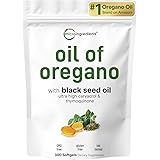Micro Ingredients Oil of Oregano Softgels, 300 Count | 2 in 1 Formulated with Black Seed Oil | 4X Strength Carvacrol & Thymoquinone | Plant Based, Non-GMO
$29.70 (as of March 3, 2026 22:55 GMT +00:00 - More infoProduct prices and availability are accurate as of the date/time indicated and are subject to change. Any price and availability information displayed on [relevant Amazon Site(s), as applicable] at the time of purchase will apply to the purchase of this product.)Antiseptics are a category of drugs that are used to prevent infection by inhibiting the growth and activity of microorganisms on living tissues. They are commonly applied to cuts, wounds, and other skin abrasions to prevent the entry and proliferation of bacteria, viruses, and fungi. Unlike antibiotics, which work internally to treat infections, antiseptics work externally and are not absorbed into the bloodstream. They play a crucial role in first aid and wound care, helping to reduce the risk of infection and promote healing.
The effectiveness of an antiseptic depends on its concentration, the type of microorganism it is targeting, and the duration of its application. Some antiseptics are broad-spectrum, meaning they are effective against a wide range of microorganisms, while others are more specific in their action. It is important to use antiseptics properly to ensure their effectiveness and prevent potential skin irritation or allergic reactions. In addition to their use in wound care, antiseptics are also used in hand sanitizers, mouthwashes, and other hygiene products to reduce the risk of infection.
While antiseptics are generally safe for external use, it is important to follow the product’s instructions and seek medical advice if necessary. Overuse or improper use of antiseptics can lead to skin irritation, and in some cases, resistance to the antiseptic agent. It is also important to note that not all antiseptics are suitable for use on all types of wounds or skin conditions, and a healthcare professional should be consulted for advice on the most appropriate antiseptic for a particular situation.
Some generic drugs in the antiseptics category include hydrogen peroxide, iodine, and chlorhexidine. Hydrogen peroxide is a common household antiseptic that works by releasing oxygen when applied to the affected area, killing bacteria. Iodine is another widely used antiseptic that is effective against a broad range of microorganisms and is often used in pre-surgical skin preparation. Chlorhexidine is a more potent antiseptic that is used in various forms, including skin cleansers and oral rinses, and is known for its long-lasting antimicrobial activity. These antiseptics, among others, play a vital role in infection prevention and control, contributing to overall public health and safety.



